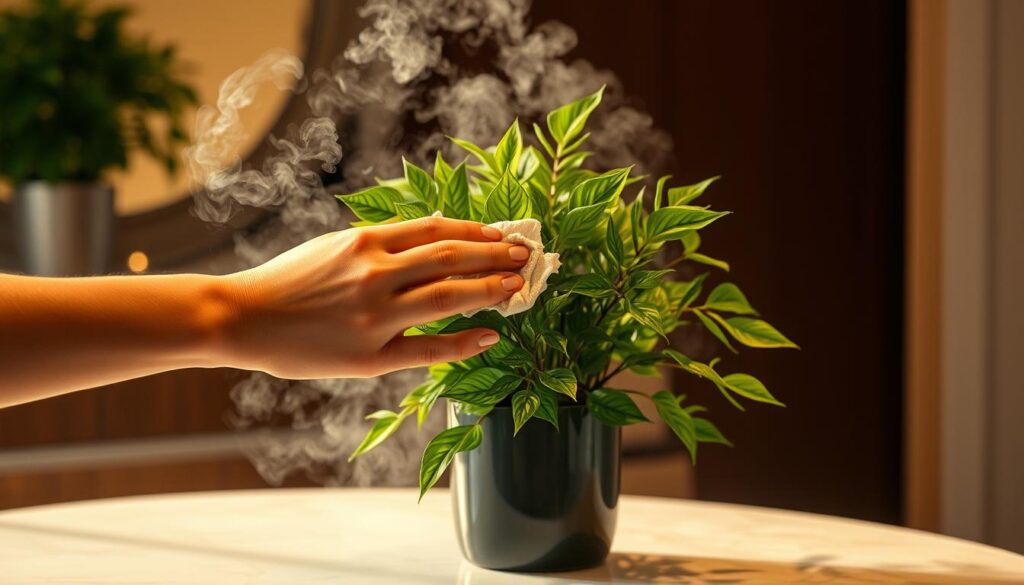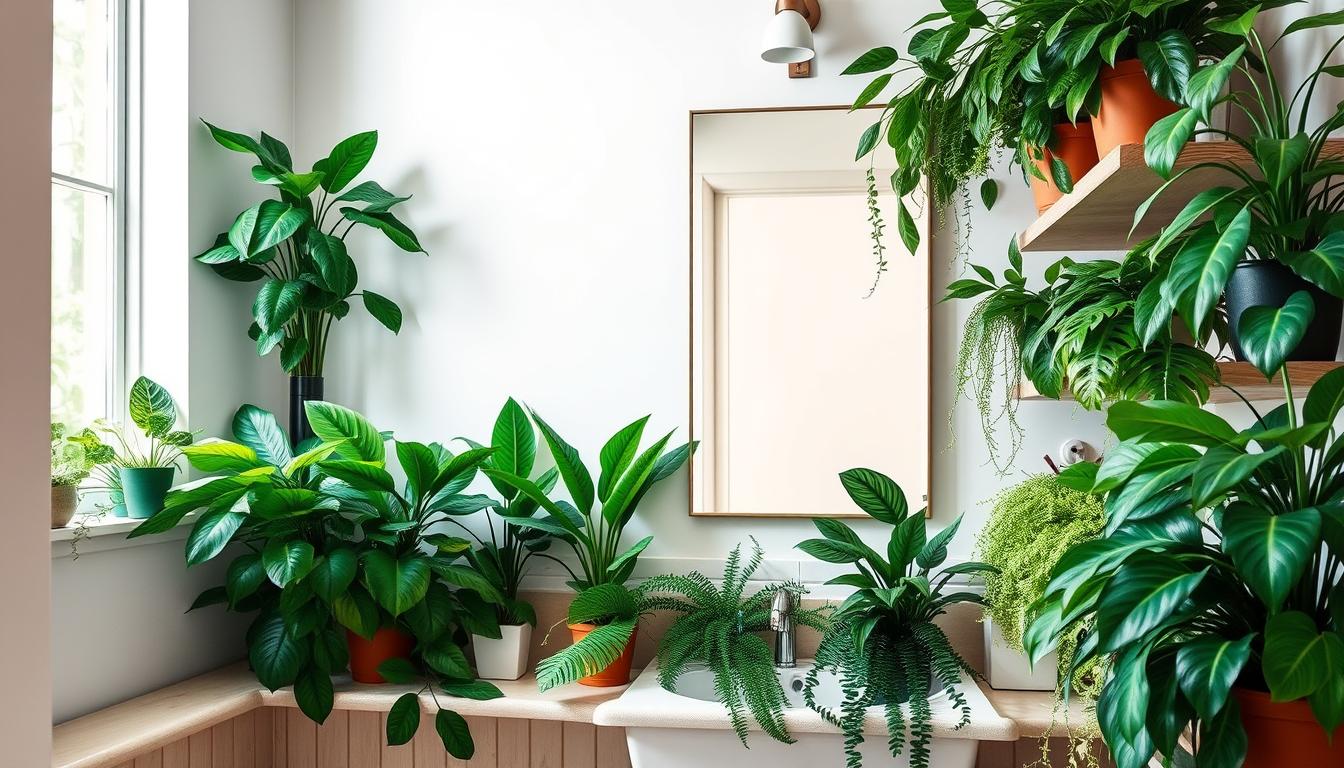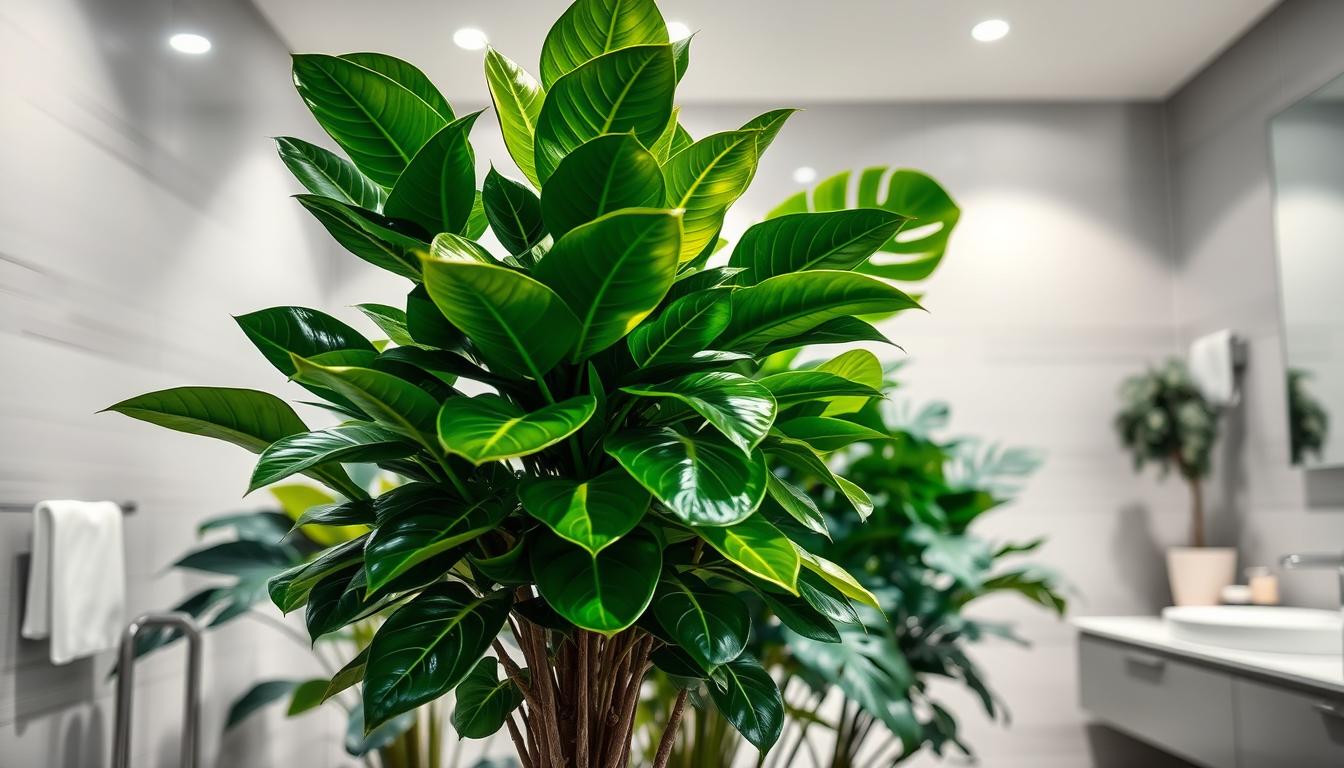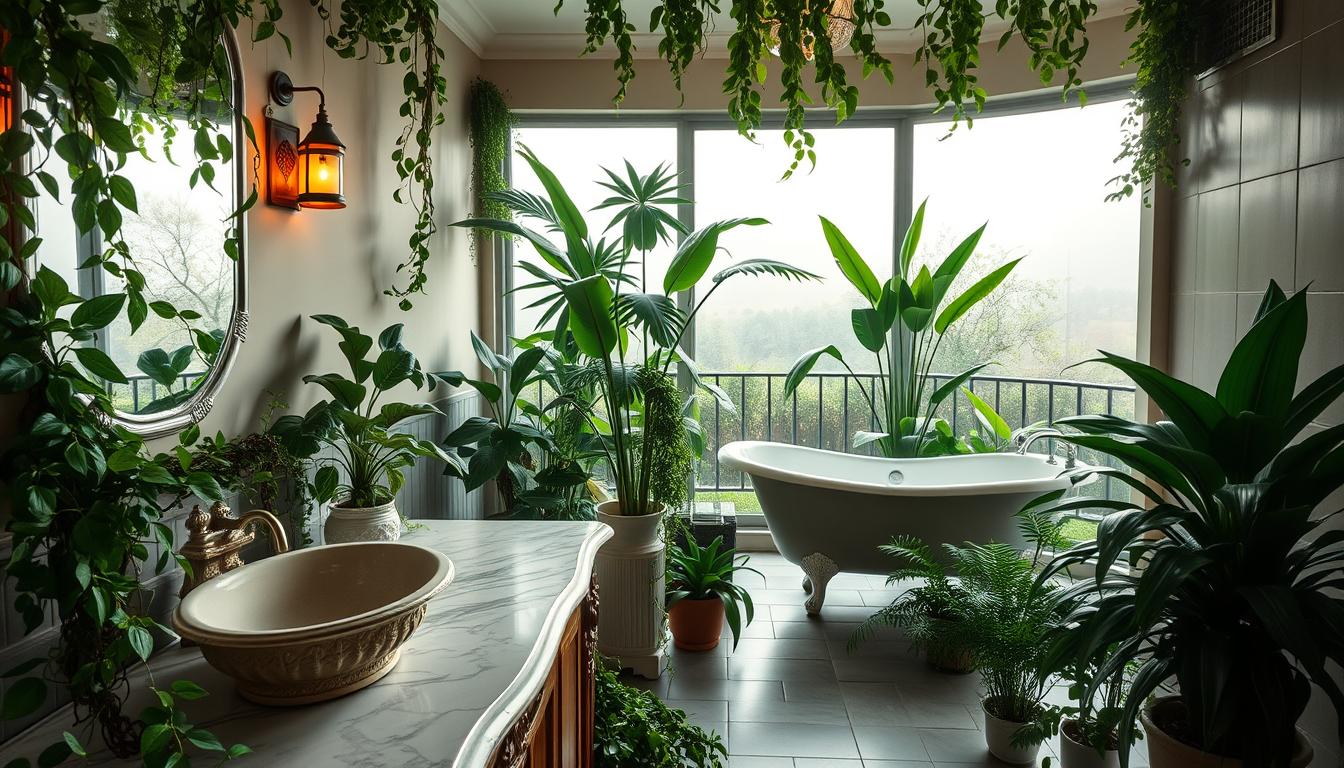Artificial plants are a great choice for modern homes, especially in damp areas where real plants can’t grow well. But, these fake plants need special care to stay beautiful. If not cleaned properly, they can gather mold and dirt, ruining their look and possibly harming your health.
To keep your artificial greenery looking its best, use eco-friendly cleaning methods. This article will show you how to care for your faux plants. By following these green tips, you can keep your decor looking fresh and safe for everyone.
Introduction to Artificial Plants and Their Care
Artificial plants are loved for looking real and being easy to care for. They make homes look better without the work real plants need. Even though they are tough, it’s key to take good care of them. Doing regular upkeep keeps them looking good and free from dust.
Having artificial plants comes with perks besides just looking nice. They don’t need sun or water, which is great for darker homes. Some think they don’t need much care, but cleaning them is important. Dusting and sometimes washing them keeps them fresh and makes them last longer.
Understanding the Need for Regular Cleaning
Regular cleaning keeps artificial plants looking beautiful and lasting longer. Dust can make them seem dull and unattractive. To keep them looking their best, you need a regular cleaning schedule that fits your space.
If your space gets dusty, like near windows or in active areas, clean monthly. This keeps dust and allergens under control, helping the air stay cleaner. If your space stays cleaner, you might only need to clean every few months.
Skipping cleanings can lead to a lot of dirt building up. When dirt gets stuck, it’s harder to clean and won’t look as nice. So, it’s important to understand why keeping up with cleaning matters. Sticking to a cleaning schedule helps keep your artificial plants and your home looking and feeling great.
Benefits of Green Cleaning Methods
Using green cleaning methods has many benefits, especially when caring for artificial plants. These eco-friendly ways keep both the environment and fake plants safe. Often, traditional cleaners have harsh chemicals. These can harm our planet through pollution and toxic effects.
Even though artificial plants are tough, these chemicals can still damage them. They can cause colors to fade and materials to break down. This makes them look less beautiful. But, there’s a better way to clean. Using natural cleaners like vinegar and mild soap works well. They clean without putting harmful stuff in your home. This makes the place safer for kids and pets.
Choosing green cleaning helps protect your artificial plants. And it does more. It helps make the earth healthier. This way of cleaning is part of living sustainably. It shows us that small changes in how we clean can make a big difference.
Common Causes of Dirt and Grime Build-Up
Different things in the environment make artificial plants dirty and grimy. Inside, dust and tiny particles from daily activities settle on them. Bugs like flies and spiders also leave stuff that makes them dirtier. Weather outside, like humidity, rain, and changing temperatures, adds more grime.
Cleaning them regularly helps fight these problems. Knowing what makes them dirty, inside and outside, helps us clean them right. This keeps artificial plants looking good and lasting longer.
Eco-Friendly Cleaning Tips for Artificial Plants in Moist Environments
Keeping artificial plants in damp places needs special care. This ensures they stay colorful and mold-free. Using eco-friendly methods is vital for the plants’ health and your indoor environment. Natural cleaners and regular care make your synthetic plants look better and last longer.
Utilizing Natural Cleaning Solutions
For moist areas, natural cleaners like vinegar, mild soap, and water work well against mold on fake plants. These cleaners are safe for the materials and clean well. Here’s how to mix an effective cleaner:
- Mix equal parts of vinegar and water for a powerful yet eco-friendly cleaner.
- Add a few drops of mild soap to the mixture for enhanced cleaning capabilities.
- Use a soft cloth or sponge to gently wipe down the surfaces of the plants.
Using these natural cleaners helps your artificial greenery and makes indoors healthier by cutting down on toxic chemicals.
The Importance of Regular Maintenance
Keeping artificial plants looking good and lasting long means regular care. Here are easy maintenance tips to keep your decor looking new:
- Dust the plants weekly to stop dirt and grim build-up.
- Check for any damage or wear, and fix any issues right away.
- Plan deep cleans every few months with natural cleaning solutions.
Regular upkeep saves your plants from damage and supports green living at home.
Best Practices for Dusting Artificial Plants
Keeping artificial plants looking fresh requires good dusting techniques. It helps them stay vibrant. Start with a microfiber cloth to wipe surfaces. Make sure all dust is gone. For small or tricky spots, use soft-bristled brushes.
Start cleaning from the top and move downwards. This stops dust from covering areas you’ve just cleaned. If some spots are hard to reach, use a hairdryer on cool. It blows dust away without harm.
By using these cleaning tips, your artificial plants will look better and last longer. They’ll keep making any room look nice.
Effective Cleaning Techniques for Different Materials
Caring for artificial plants needs a special plan depending on their material. This ensures they last long and look good. Knowing the right way to clean plastic, silk, and paper flowers keeps them nice. It also makes sure they work well in your space.
Cleaning Plastic Plants
Plastic plants are tough and don’t easily get damaged. Use mild cleaners with warm water for best results. A soft cloth or sponge works great to remove dust and dirt. Then, rinse them with water and let them air dry to avoid moist spots.
Cleaning Silk Plants Carefully
Silk flowers are delicate and need gentle care. Don’t use water directly on them to avoid harm or color loss. To clean, softly wipe with a dry microfiber cloth. If they need more cleaning, lightly mist them and dry right away. This keeps colors bright and prevents marks.
Handling Paper Flowers Without Damage
Paper flowers are very fragile and can’t be cleaned with water. Use a gentle brush or air spray to take off dust. Gently tapping or shaking them also works to get rid of dirt. These steps protect the paper from damage, keeping your decorations looking new.
Utilizing Tools for Enhanced Cleaning
Choosing the right cleaning tools makes maintaining artificial plants much easier. These tools do not just make cleaning simpler. They also keep the plants safe from harm. Microfiber cloths and dusting brushes are two essential items.
The Role of Microfiber Cloths
Microfiber cloths are a must-have for cleaning artificial plants. Their special fibers catch dust without leaving anything behind. This keeps your plants looking good without scratching them.
Effective Use of Dusting Brushes
Dusting brushes are crucial for a thorough clean. They have soft bristles that get into small spaces. This lifts dust from hard-to-reach parts of artificial plants. Remember to handle these brushes gently to not break anything.
Deep Cleaning Methods for Stubborn Dirt
Deep cleaning is vital for getting rid of tough dirt regular cleaning can’t touch. Use special cleaners for artificial plants. A mix of gentle soap and warm water is best for a safe and thorough clean. Soaking is great for plastic plants, as they won’t get damaged underwater.
Always follow what the maker says when cleaning. This keeps the material safe and ensures a deep clean. It also stops mold. Regular deep cleaning keeps your artificial plants looking new for longer.

The Importance of Drying After Cleaning
After you clean artificial plants, it’s key to dry them well. This stops moisture from building up, which can lead to mold. Using air-drying and towels to pat the plants down removes all moisture. This is super important where it’s often humid.
To dry artificial plants right, follow these tips:
- Air-dry in a spot with good air flow to speed up drying.
- Gently dab leaves and stems with a clean towel to take off extra water.
- Arrange the plants so air can get to all parts easily.
Using these tips helps keep your artificial plants looking good. It also cuts down on mold and mildew risks in wet places.
Conclusion
Keeping artificial plants clean is key to making your home look and feel good, especially in places that are damp. If you follow the green cleaning tips we’ve talked about, you can keep your fake plants looking new for longer. Cleaning them often not only keeps them pretty but also stops dust and allergens from gathering in your home.
Remembering to clean your artificial plants regularly is important. Doing so keeps your living space welcoming and clean. It also helps make your indoor air safer and healthier. By sticking to these maintenance tips, your home will benefit from your beautiful artificial plants.
Caring for your artificial plants doesn’t take much effort, but it makes a big difference. Keeping up with their maintenance means they’ll always add beauty and value to your home. This shows you care about keeping your space clean and green.



